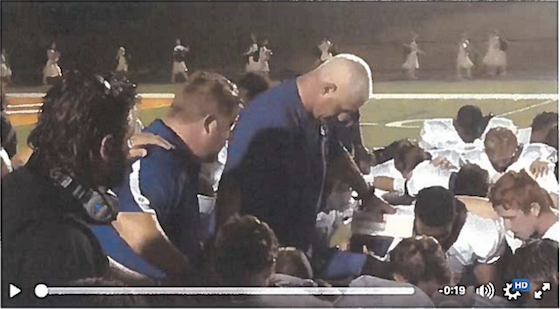In Monrovia, California, a quiet but seismic cultural confrontation has erupted—and it’s playing out on the gridiron. The Freedom From Religion Foundation (FFRF), a prominent atheist advocacy group, has issued a demand: football coaches must cease praying with their athletes before games.
This request, though couched in legalese about church‑state separation, strikes at the heart of a tradition that many conservative Christians hold dear—that of faith openly woven into the fabric of American life.
The FFRF’s Stance and Its Shadows
In a letter to the Monrovia Unified School District, FFRF staff attorney Sammi Lawrence asserted that “Public school coaches cannot constitutionally lead their teams in prayer or promote their personal religious beliefs to student-athletes”.
Their concern is rooted in the notion of coercion—asserting that student‑athletes may feel undue pressure to participate in prayer to please coaches or remain in good standing on the team.
Yet this legalistic framing often ignores the lived reality of how faith permeates community and culture. Here, faith and football are not disparate elements—they’re like “mom and apple pie,” timeless American touchstones interwoven through generations Todd Starnes.
A Broader Trend of Secular Overreach
This isn’t an isolated incident; it represents a broader pattern of atheist activism in public education. The FFRF has previously raised concerns over high‑school coaches leading athletes in prayer, accusing them of religious coercion and citing student discomfort.
Such actions, while ostensibly about protecting constitutional rights, frequently amount to suppressing voluntary expressions of faith, particularly in tight‑knit communities where religious identity is an integral part of social life.
Legal Landmarks and the Road Ahead
Conservative Christians might take solace in the Supreme Court’s decision in Kennedy v. Bremerton School District (2022). In that landmark ruling, Justice Neil Gorsuch, writing for the majority, affirmed that a public school coach praying at mid‑field after games—so long as it was a personal, quiet observance—could not be punished under the Establishment Clause. Instead, such actions are protected under the Free Speech and Free Exercise Clauses of the First Amendment Wikipedia.
The Court emphasized that dismissing these quiet, voluntary prayers was a misapplication of constitutional principles, warning that the government “may not suppress religious expression simply because it is religious”.
The ruling didn’t authorize coercive or school‑led prayer, but it defended individual expressions of faith—precisely the kind of conduct now under scrutiny in Monrovia.
Moral and Cultural Imperatives
From a conservative Christian perspective, this moment in Monrovia is not just about legal rights—it’s about cultural integrity and spiritual witness. Removing prayer from the sidelines in effect erases a vibrant expression of faith in our public life. It sends a message: religious belief is private, perhaps even embarrassing, unfit for display in communal arenas. That inevitability, if allowed to persist, weakens the moral foundation of schools and communities alike.
Moreover, the idea that student‑athletes are coerced into prayer presumes a kind of spiritual intimidation that borders on caricature. Yes, coaches hold influence—but what’s wrong with a coach inviting a moment of reflection or blessing before competition, especially when participation is voluntary and deeply rooted in tradition?
Conclusion: A Defense of Faith and Football
The FFRF’s call to end pre‑game prayer in Monrovia represents not only a legal challenge but a cultural affront to the role of faith in public life. It demands that coaches set aside their religious convictions in the name of neutrality—a neutrality that, paradoxically, betrays its own commitment to pluralism. Conservative Christians must not retreat. Instead, we should defend voluntary expressions of faith—like a coach quietly praying with willing athletes—as essential to our national heritage and moral fiber.
In the coming conversations, we must elevate the true meaning of the First Amendment—not just the separation of church and state, but the Free Exercise of religion that empowers every citizen, including those in the athletic community, to live openly and honorably by their convictions.


